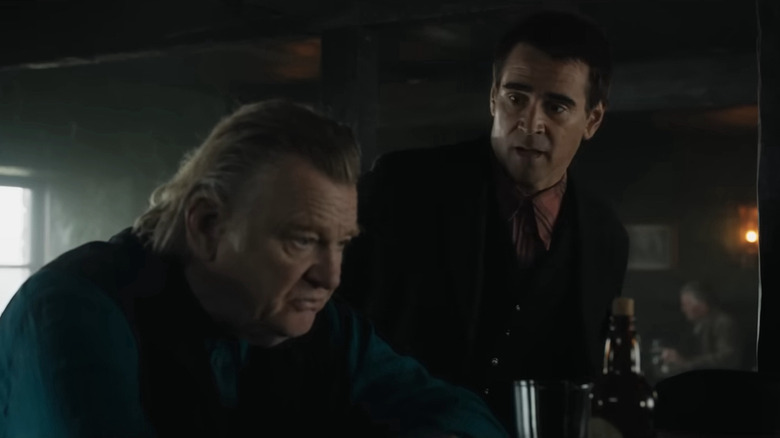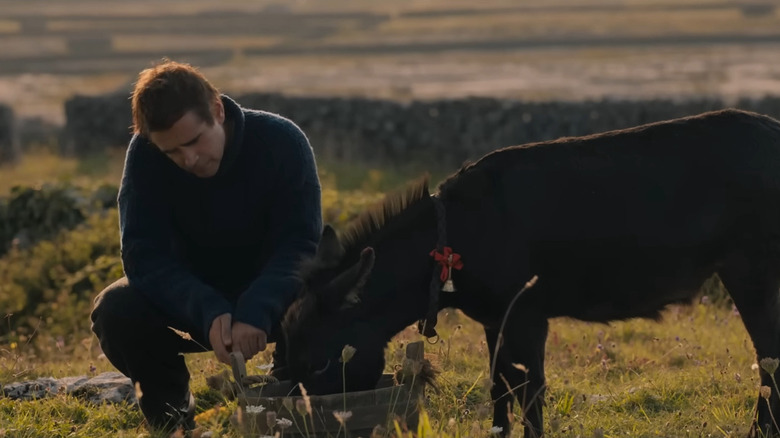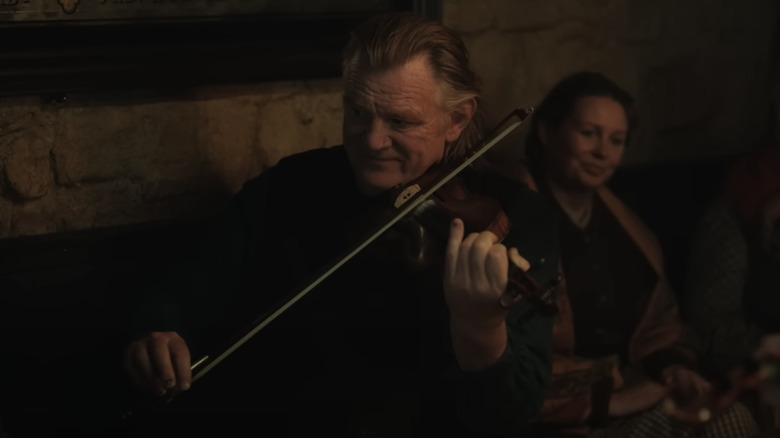Why The Banshees Of Inisherin Has Such An Unconventional Soundtrack
"The Banshees of Inisherin" could not be more Irish if it tried. Even if you look beyond its Irish cast, filmmaker, and setting, the entire story of the picture essentially is a dark fable about the Irish Civil War. This is a film that could not exist without Ireland. However, the sound of "The Banshees of Inisherin" isn't particularly Irish. When the film opens on Colin Farrell happily strolling to his friend's house, even given the background of a rainbow, the music we hear is Bulgarian. It is a choral arrangement of a Bulgarian folk song called "Polegnala e Todora," which was released in 1975 on the album "Le Mystère des Voix Bulgares" by the Bulgarian State Radio & Television Female Vocal Choir.
This distinctly not Irish music setting the tone for an Irish story may seem like an odd choice, but for Martin McDonagh and composer Carter Burwell, it was entirely by design. The content of the picture was Irish enough that it didn't need the extra place setting on the soundtrack. The internationality of the soundtrack didn't stop at Bulgaria either. The previously recorded pieces used range from Germany to Indonesia, and when it came to crafting the actual original score, they wanted to eschew the conventions of Irish music as well. Burwell told Variety of their conversations about crafting the film's soundscape, "[McDonagh] said, 'I hate that deedle-dee, old world Irish film music and I knew it wasn't going to be that.'" So, instead of taking inspiration from the setting, Burwell turned to the genre of the picture to guide him: the fairytale.
Looking to the Grimm brothers
Much of the work of Martin McDonagh, primarily on the stage, exists just on the outside of reality. He creates worlds that resemble ours but have a slightly absurd moral conundrum at the heart of them. In "The Banshees of Inisherin," that fairytale setup lies in Brendan Gleeson's Colm one day deciding he no longer wishes to be friends with Colin Farrell's Pádraic, and if Pádraic talks to him, Colm will cut off a finger and give it to his ex-friend. While thinking about the score, Carter Burwell happened to read the classic Grimm fairytale "Cinderella" to his daughter, and the much darker tone of that original story — compared to the Disneyfied version more commonly known — paralleled quite nicely with McDonagh's film. Burwell told Variety:
"It's gruesome but it's a fairy tale. I realized that it helped gave me an insight into the score ... It was going to make the physical violence of the film which Branden inflicts on himself a little more metaphorical."
Instead of fiddles and accordions that you would tend to find in Irish folk music, Burwell's score turns to harps, flutes, and incredibly resonant bells for a haunting, mysterious vibe that both builds tension and harkens back to a time long past. The bells, in particular, add this uneasy whimsy to the picture, which could not better describe the work of Martin McDonagh. For my money, Carter Burwell is one of the best composers working in film today and has not been properly recognized for his decades of incredible work. This is just one of many examples of him approaching a piece of material in a way that seems fairly obvious on its face and completely turning it on its head.
The diegetic music can be Irish
Some Irish music does slip into "The Banshees of Inisherin." Brendan Gleeson plays a musician in the film, a composer whose instrument of choice is the fiddle. In terms of what we think about Irish music, it doesn't get more traditional than the fiddle. However, the music Gleeson plays in the picture was not written by Carter Burwell. The actor composed the piece his character crafts throughout the picture himself, as he is a fiddle and mandolin player in real life (which he demonstrated on "Saturday Night Live"). As he is an Irish man playing an Irish character in an Irish setting, he can't help but create a piece of music that feels like part of the country.
Burwell had no intention of composing that piece, saying, "I never did submit a concept for that. Brendan on camera writes his own piece and it was just perfect for the character." It wouldn't exactly make sense for Gleeson's Colm to be writing his own Bulgarian choral music. The application of diegetic and non-diegetic music are two entirely different things. Creating the tone of "The Banshees of Inisherin," Martin McDonagh and Carter Burwell were free to do whatever they wished, as they are the authors creating this world. But within the world of the film, it needed to be Irish, and Brendan Gleeson could deliver that himself.


